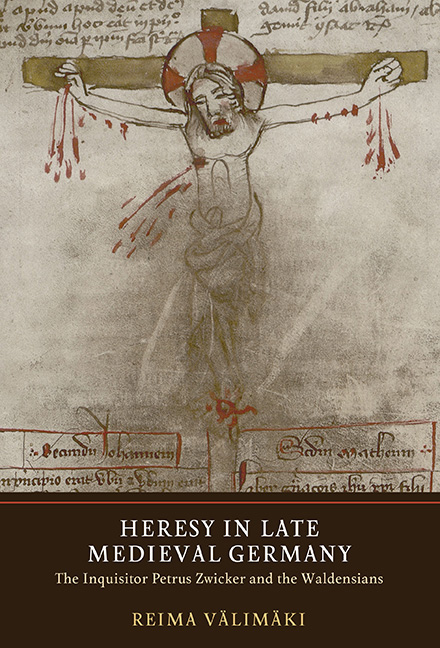Book contents
- Frontmatter
- Dedication
- Contents
- List of Illustrations
- Author's Note
- Acknowledgements
- List of Abbreviations
- Introduction
- 1 Petrus Zwicker and the Career of an Inquisitor at the Turn of the Fifteenth Century
- 2 The Inquisitor Writes
- 3 The Inquisitor's Practice and his Legacy
- 4 Communicating Faith
- 5 The Dissidents, the Clergy and the Church
- Epilogue: The Consolation of Inquisition
- Appendix 1 Manuscript Descriptions
- Appendix 2 Chapters and Titles of the Cum dormirent homines according to Jacob Gretser (1613/77)
- Appendix 3 The Circulation of the Processus Petri together with the Cum dormirent homines
- Appendix 4 Inquisitors' Manuals of St Florian and Linz
- Appendix 5 Collation of Formularies in St Florian, MS XI 234 and Würzburg, UB MS M. ch. f. 51
- Bibliography
- Index
- YORK MEDIEVAL PRESS: PUBLICATIONS
2 - The Inquisitor Writes
Published online by Cambridge University Press: 26 March 2019
- Frontmatter
- Dedication
- Contents
- List of Illustrations
- Author's Note
- Acknowledgements
- List of Abbreviations
- Introduction
- 1 Petrus Zwicker and the Career of an Inquisitor at the Turn of the Fifteenth Century
- 2 The Inquisitor Writes
- 3 The Inquisitor's Practice and his Legacy
- 4 Communicating Faith
- 5 The Dissidents, the Clergy and the Church
- Epilogue: The Consolation of Inquisition
- Appendix 1 Manuscript Descriptions
- Appendix 2 Chapters and Titles of the Cum dormirent homines according to Jacob Gretser (1613/77)
- Appendix 3 The Circulation of the Processus Petri together with the Cum dormirent homines
- Appendix 4 Inquisitors' Manuals of St Florian and Linz
- Appendix 5 Collation of Formularies in St Florian, MS XI 234 and Würzburg, UB MS M. ch. f. 51
- Bibliography
- Index
- YORK MEDIEVAL PRESS: PUBLICATIONS
Summary
Item dicunt quod ex institucione ecclesie nichil tenentur credere nisi textui biblie.
And they say that nothing from the institution of the Church is worth believing if not from the text of the Bible.
Waldensian articles from the 1390s.
In 1395 Petrus Zwicker rewrote the Waldensian heresy. There is no doubt that the Cum dormirent homines was his most important work. It is also the most important anti-Waldensian text of the later Middle Ages, in terms of length and popularity as well as the expertise of its author. It was not, of course, conceived overnight. The composition of a long treatise such as the Cum dormirent homines was an arduous process, and included several phases. This chapter demonstrates that in addition to the finished treatise, an early version of Zwicker's polemic against the Waldensians has been preserved in a shorter polemical text, known as the Refutatio errorum, often copied together with the Cum dormirent homines and treating material very similar to the themes discussed in the longer treatise. This text has been known, acknowledged and cited by scholars, but not properly studied, and its author was previously unidentified. On the basis of both codicological and internal evidence, presented here for the first time, we can be relatively certain that the text originated from the hand of Petrus Zwicker – or rather, that its early version was compiled in the circle around him, probably before the completion of the Cum dormirent homines in 1395. Recognizing the shared origin of the two treatises underlines the uniqueness of the latter work, which can be regarded as the finalized product of Zwicker's anti-heretical literary endeavours. Studying what was preserved, changed and left out in this process of compilation and revision brings to light a revival of the thirteenth-century polemical style combined with contemporary emphasis on the authority of the Scriptures. These were the literary characteristics of this pastoralization of heresy. Zwicker not only compiled existing knowledge on Waldensianism, but also aimed higher. He created a polemical treatise matching the style and vigour of the thirteenth-century anti-heretical treatises and directed against the enemy he deemed the worst threat to the Church: the Waldensians. It was intended for an audience wider than inquisitors, and the sheer number and diffusion of the surviving manuscripts show it was a howling success.
- Type
- Chapter
- Information
- Heresy in Late Medieval GermanyThe Inquisitor Petrus Zwicker and the Waldensians, pp. 38 - 103Publisher: Boydell & BrewerPrint publication year: 2019



